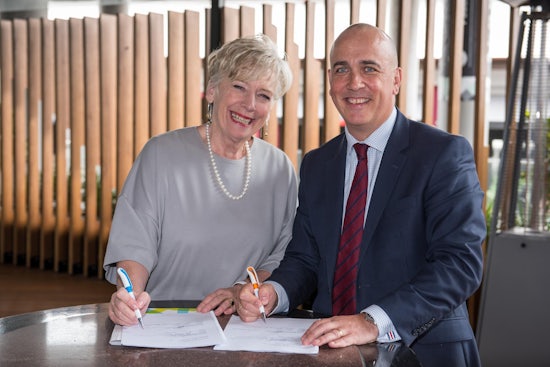RDNS partners with Maggie Beer Foundation
Royal District Nursing Service (RDNS) has partnered with the Maggie Beer Foundation to help foster the healthy food message through the organisation’s home nursing and people support network.

Maggie Beer and RDNS executive general manager Dan Woods sign the partnership agreement.
The partnership initiative has been described by RDNS executive general manager Dan Woods as a “very exciting initiative that has the potential to benefit tens of thousands of people”.
RDNS will deliver nourishment and nutritional educations sessions – all of which will be supported by the Maggie Beer Foundation – to communities throughout Australia. Activity centres, retirement villages and community centres will be among the venues for these sessions.
“This is what could arguably be called the perfect fit,” says Mr Woods.
“The Maggie Beer Foundation philosophy is aligned with ours in so many ways – we are both championing healthy lifestyles for our Australians wherever they may be and irrespective of age group.”
“RDNS supports more than 100,000 Australians around the country,” Mr Woods says.
“It is a fantastic notion that we can encourage our clients and the people we support as well as community groups with whom we come in touch to keep good nutrition top of mind.”
Maggie Beer is one of Australia’s best known cooks and food authors. She is a familiar face on TV as co-host on the ABC’s The Cook and The Chef and more recently through guest appearances on Masterchef.
Awarded Senior Australian of the Year in 2010, Mrs Beer was appointed a Member of the Order of Australia two years later for service to the tourism and hospitality industries as a cook, restaurateur and author, and to the promotion of Australian produce and cuisine”.
Her foundation was established last year – guided, she says, by the belief that “with help from so many committed people we can bring about life-altering change to the wellbeing of the ageing population by having access to food full of flavour and nutrients”.
“It should be everyone’s right to have good food and I believe that no one group of people need it more. My hope is that every meal can give comfort and pleasure, always something to look forward to.”
“There is much work to be done but the journey is so exciting,” Mrs Beer says.
The Maggie Beer Foundation has agreed to support the RDNS nourishment and nutrition sessions both throughout the trial period which extends to the end of the year – and as part of the national rollout commencing February 2016.























